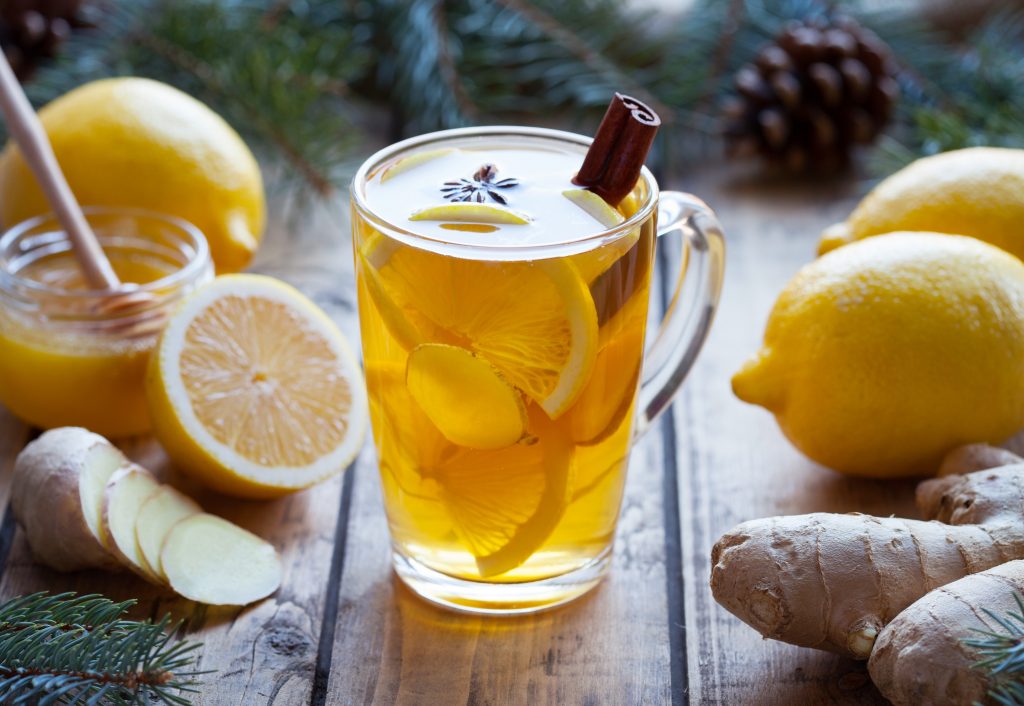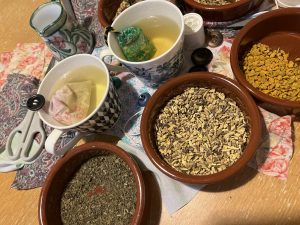
Preserving Workshops: Spices, Wine and Christmas
In the last instalment of our winter blog mini-series, Anna looks at various early modern recipes which included the spices we now associate with Christmas and which have known sleep benefits. She also details some of the teas we have been creating with visitors.
Our final 2023 workshops at Ordsall Hall have looked at the early modern use of spices for sleep during the winter. We have been creating sleepy and digestive teas to combat overindulgence and oft-disrupted sleep patterns over Christmas, based on early modern advice and recipes.
Winter and Spice Advice
Almanacs were early modern books published each year on a range of topics, including seasonal changes, horticultural and agricultural rhythms, and the adaptations that needed to be made to personal habits and routines throughout the year. Where health was concerned, the advice was to eat and drink according to the season, varying what one did depending on the environment and climate. So, when the weather was warm, you had to consume things that were cooling to keep your health in balance. In contrast, in winter the climate was cold and wet or ‘phlegmatic’. This could cause imbalance, which was dangerous to body and mind and could, if not checked, cause you to sleep too much.
To combat this, as well as take care of digestion and nutrition, people were advised to consume more spices and wines in the winter to keep the stomach warm – warming and drying people internally and keeping bodily functions in good working order. Early modern people consumed cinnamon, nutmeg, ginger, fennel, and liquorice to aid good sleep by closing the the mouth of the stomach, and so allowing the contents to ‘concoct’ inside. The goodness evaporating up from the stomach would then rise up to the head in the form of vapours, cooling and refreshing the brain. The sleep-inducing properties of these ingredients are recognised today: calming tension in the body, aiding digestion, and promoting relaxation before bed.
Gingerbread
One early modern Christmas dish that included a lot of these ingredients, alongside warming red wine, was gingerbread. This was often served during the ‘banquet’ course, the sweet course at the end of the meal, to help settle the stomach.
To make early modern gingerbread:
Take claret wine and colour it with turnsole [sandalwood], and put in sugar and set it to the fire; then take wheat bread finely grated and sifted, and liquorice, aniseeds, ginger, and cinnamon beaten very small and searced [sifted]; and put your bread and your spice all together, and put them into the wine and boil it and stir it will it be thick; then mould it and print it at your pleasure, and let it stand neither too moist nor too warm.
A modern alternative:
This recipe is relatively straight forward. Combine red wine and sugar and heat as you would mulled wine. In fact, heating a mulled wine would be perfect for this recipe. Add the spices to your wine, omitting too many if you are using a ready-mulled wine (you may also need less sugar). Add to this your breadcrumbs and combine until you have a thick, mouldable paste. You can transfer the gingerbread mix to a greased and lined baking tray and press down. Cut into squares, dust with any additional spices, and leave to cool and set. You should then be able to remove squares individually to eat. This is a strong and rich gingerbread and so you only need a couple of small squares at most as one serving. Perfect for after dinner.
Wassail (Spiced)
A warming spiced drink at this time of year was wassail, made from the apples harvested in late autumn. In a version called ‘lambswool’, apple pulp was added to ale with spices, sometimes with eggs too, and drank communally as part of festive celebrations. Special wassail bowls were used to hold the drink which could be carried around the community to share, akin to Halloween trick or treating, in exchange for festive hospitality. This can be seen in this detail recorded by Henry Machin on Twelfth Night 1555:
‘Into room came 12 wessells with maidens singing, with their wessells; and after came the chief wives singing with their wessells; and then gentlewoman had ordained a great table of banquet, desserts of spices and fruit, as marmalade, gingerbread, jelly, comfit, sugar plate and divers others’.
Poet Robert Herrick, in 1648 gives a rough recipe for the tipple:
Next crown a bowl fullwith gentle lambs wool:Add sugar, nutmeg, and ginger,with store of ale too;And thus ye must doto make the wassail a swinger.
Some wassails were made with cider instead of ale, and you can adapt as you please with this modern ‘lambswool’ recipe:
Ale or cider (3 bottles)6 cooking apples, coredTsp ground nutmegTsp ground ginger150g sugarBake the apples, skin on, in the oven until they are soft and fluffy inside (about 30 mins in a low oven, 140oC or gas mark 1. Scoop out the pulp when they are cool enough to handle. In the meantime, while the apples are baking, heat the ale or cider in a large pan and add the spices and sugar. Mash the apple pulp up so they are no lumps and stir into the wassail mix in the pan. Heat through on a low heat for 30 mins and then serve. If you like you can include 6 eggs, whites and yolks beaten together, and added to the cider/ale mixture before heating. Keep stirring so you don’t end up with scrambled eggs!
Apples were thought to help sleep, provided they were combined with spices. Serving them alongside other banqueting dishes such as marmalade (quince paste – see our first winter blog post), comfits (sugar coated fennel seeds), and gingerbread, would provide a mix of ingredients to celebrate but also prep the stomach for digestion and sleep. Today, we might see this mix as a perfect recipe for indigestion or what early modern people would term a ‘surfeit.’
Christmas Overindulgence
If overindulgence is a problem at Christmas and is affecting your sleep, then take a tip from early modern people who made a variety of ‘surfeit’ waters to relieve the stomach. A lot of the ingredients, thought to aid digestion, also helped people to sleep. Rose and fennel were common ingredients, distilled with alcohol, and turned into medicinal waters to take after meals.
An early modern ‘surfeit’ water:
An Excellent Aqua Composita for a Surfeit:Take a handful of rosemary, a root of elecampane, a handful of hyssop, half a handful of thyme, 6 handfuls of sage, as much mint and as much pennyroyal, half a handful of horehound, 2 ounces of liquorish well bruised, and as much aniseeds, take two gallons of the best strong ale, and all the herbs aforesaid, and wring them asunder, and put into an earthen pot well covered, and let them stand a day and a night; from thence put it into a brass pot and set it on a fire, and let it stand till it boyle, then take it from the fire, and set your limbeck on the pot, and stop it close with paste that there come no air out of it, and still it out with a soft fire, add to it a little red fennel.
Modern digestive teas:
Surfeit waters can be made today either through infusing the ingredients in alcohol or, for a more calming way to benefit from them, turning the commonly-recurring herbs, spices, and flowers into teas to sooth the stomach. They may even help us get to sleep, by encouraging some much-needed melatonin, amongst all the excitement, excess, and disruption that Christmas can bring to our daily routines.

Homemade reusable tea-bags with sleepy ingredients infusing in water. Photo credit: Anna Fielding.
Liquorice, fennel, and mint tea:
Boil water with a little chopped liquorice, fennel seeds, and dried mint. Infuse.
Liquorice is great for digestion and can encourage sleep but it can also adversely cause low blood pressure and should be taken in small amounts only. If you prefer, omit the liquorice and try mint and fennel. All these ingredients give a pleasant sweetness and can help relieve indigestion and bloating.
Ginger and turmeric tea:
Boil 500ml hot water with 3 tsp ground turmeric, 1 tbsp grated ginger, orange zest, and honey. Infuse for five minutes. Strain and enjoy.
Using spices for digestion is something early modern people did at the end of meals. As well as fennel, other spices such as cinnamon, ginger, and nutmeg appear regularly in old after dinner recipes for surfeits or overindulgence.* Turmeric does not appear in early modern recipes but is another spice that is great for digestion as well as having sleep-improving benefits and helping relax you at bedtime, especially in warm milk as a ‘golden latte’.
Our Ordsall workshops and recipes this autumn and winter have been centred around the preservation of sleepy ingredients, the use of spices for sleep and digestion, and the processing of fruits such as apples and quince to harness their sleep benefits in what early modern people believed to be medicinally sound ways.
We will be running more workshops throughout 2024 where we explore different aspects of sleep remedies and foods. These will be two-hour afternoon sessions to allow us time to test old recipes and try out longer processes. A full list of workshops for 2024 will be made available over the next few months. Please see the Sleeping Well at Ordsall Hall page for updates.
* If using cinnamon to make your own infusions, please ensure your cinnamon is Ceylon cinnamon (available online) rather than cassia cinnamon which is the type regularly available in shops. Cassia cinnamon can be dangerous due to high levels of coumarin which can adversely affect the liver. If using cassia cinnamon, limit yourselves to one teaspoon per day, or one cup of cinnamon tea. If you buy Ceylon cinnamon sticks, you can reuse them several times.








0 Comments